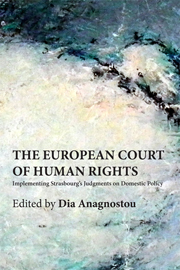Book contents
- Frontmatter
- Contents
- The contributors
- Acknowledgements
- Introduction: Untangling the domestic implementation of the European Court of Human Rights' judgments
- Part I INSTITUTIONAL DYNAMICS OF DOMESTIC IMPLEMENTATION
- Part II LEGAL MOBILISATION AND THE POLITICAL CONTEXT OF IMPLEMENTATION
- 4 European human rights case law and the rights of homosexuals, foreigners and immigrants in Austria
- 5 Political opposition and judicial resistance to Strasbourg case law regarding minorities in Bulgaria
- 6 Under what conditions do national authorities implement the European Court of Human Rights' rulings? Religious and ethnic minorities in Greece
- 7 A complicated affair: Turkey's Kurds and the European Court of Human Rights
- 8 The European Court of Human Rights and minorities in the United Kingdom: catalyst for change or hollow rhetoric?
- 9 Politics, courts and society in the national implementation and practice of European Court of Human Rights case law
- List of European Court of Human Rights judgments and European Commission on Human Rights cases
- Index
6 - Under what conditions do national authorities implement the European Court of Human Rights' rulings? Religious and ethnic minorities in Greece
from Part II - LEGAL MOBILISATION AND THE POLITICAL CONTEXT OF IMPLEMENTATION
Published online by Cambridge University Press: 05 April 2014
- Frontmatter
- Contents
- The contributors
- Acknowledgements
- Introduction: Untangling the domestic implementation of the European Court of Human Rights' judgments
- Part I INSTITUTIONAL DYNAMICS OF DOMESTIC IMPLEMENTATION
- Part II LEGAL MOBILISATION AND THE POLITICAL CONTEXT OF IMPLEMENTATION
- 4 European human rights case law and the rights of homosexuals, foreigners and immigrants in Austria
- 5 Political opposition and judicial resistance to Strasbourg case law regarding minorities in Bulgaria
- 6 Under what conditions do national authorities implement the European Court of Human Rights' rulings? Religious and ethnic minorities in Greece
- 7 A complicated affair: Turkey's Kurds and the European Court of Human Rights
- 8 The European Court of Human Rights and minorities in the United Kingdom: catalyst for change or hollow rhetoric?
- 9 Politics, courts and society in the national implementation and practice of European Court of Human Rights case law
- List of European Court of Human Rights judgments and European Commission on Human Rights cases
- Index
Summary
Courts have often served as an alternative arena for minorities to claim their rights when other avenues of political participation are closed or ineffective. While not specifically intended to protect minorities, the European Court of Human Rights (hereafter ECtHR) has pre-eminently provided such an arena. Over time, it has developed a substantial case law related to minority rights by creatively, and at times expansively, interpreting the fundamental rights contained in the European Convention of Human Rights (hereafter ECHR or Convention). However, the ability of courts to uphold the rights of minorities and to influence how governments treat them has been a highly controversial issue. Such influence is contingent and varies across different issue areas and perhaps time periods. While judicial bodies lack the power to enforce their decisions, their authoritative interpretations of minority rights claims can have important legal and policy-related effects. This chapter examines the conditions under which the judgments of the ECtHR can promote rights-expansive legal reforms and domestic policy change pertaining to minorities by focusing on the case of Greece.
Small but salient historical minorities, religious and ethnic ones, remained excluded for most of the post-World War II period from Greece's political system and society. The preservation of emergency legislation which had been enacted during the civil war of the 1940s into the Cold War period undermined the enforcement of constitutional rights guarantees against state abuses, particularly for political or ethnic groups that were considered actually or potentially disloyal to the Greek nation.
- Type
- Chapter
- Information
- The European Court of Human RightsImplementing Strasbourg's Judgments on Domestic Policy, pp. 143 - 165Publisher: Edinburgh University PressPrint publication year: 2013



